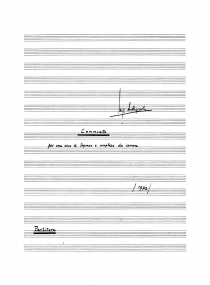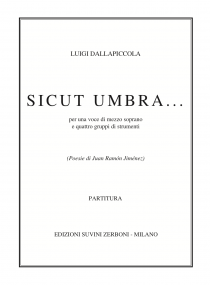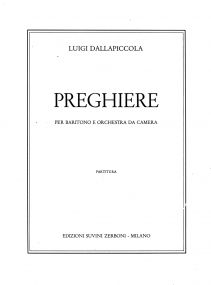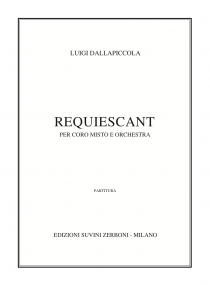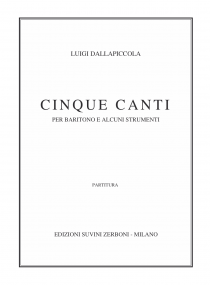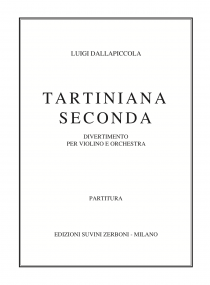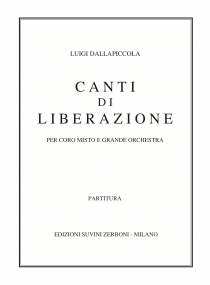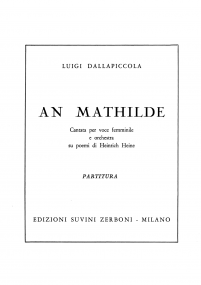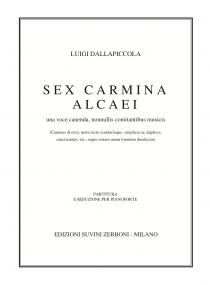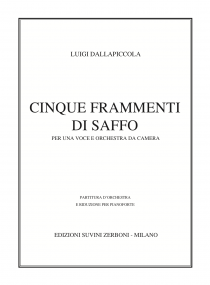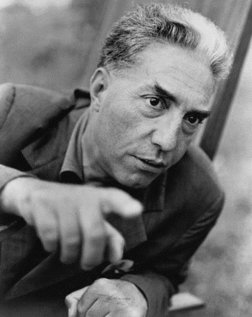
Luigi Dallapiccola
Play all audio recordingsDallapiccola was born in Pisino d'Istria (at the time part of the Austrian empire, current Pazin, Croatia), to Italian parents.
Unlike many composers born into highly musical environments, his early musical career was irregular at best. Political disputes over his birthplace of Istria, then part of the Austro-Hungarian empire, led to instability and frequent moves. His father was headmaster of an Italian-language school – the only one in the city – which was shut down at the start of World War I.
The family, considered politically subversive, was placed in internment at Graz, Austria, where the budding composer did not even have access to a piano, though he did attend performances at the local opera house, which cemented his desire to pursue composition as a career. Once back to his hometown Pisino after the war, he travelled frequently.
Dallapiccola took his piano degree at the Florence Conservatory (now known as the Luigi Cherubini Conservatory) in the 1920s. He also studied composition with Vito Frazzi. He became a professor at the conservatory in 1931; until his 1967 retirement he spent his career there teaching lessons in piano as a secondary instrument, replacing his teacher Ernesto Consolo as the older man's illness prevented him from continuing. Dallapiccola's students include Abraham Zalman Walker, Luciano Berio, Bernard Rands, Donald Martino, Halim El-Dabh, Ernesto Rubin de Cervin,
Arlene Zallman, Roland Trogan, Noel Da Costa, and Raymond Wilding-White. See: List of music students by teacher: C to F#Luigi Dallapiccola.
Dallapiccola's early experiences under the fascist regime of Benito Mussolini, who governed Italy from October 1922 to July 1943, colored his outlook and output for the rest of his life. He once supported Mussolini, believing the propaganda, and it was not until the 1930s that he became passionate about his political views, in protest to the Abyssinian campaign and Italy's involvement in the Spanish Civil War. Mussolini's sympathy with Adolf Hitler's views on race, which threatened Dallapiccola's Jewish wife Laura Luzzatto, only hardened his stance. Canti di prigionia and Il prigioniero are reflections of this impassioned concern; the former was his first true protest work.
During World War II he was in the dangerous position of opposing the Nazis; though he tried to go about his career as usual, and did, to a limited extent. On two occasions he was forced to go into hiding for several months. Dallapiccola continued his touring as a recitalist – but only in countries not occupied by the Nazis.
Though it was only after the war that his compositions made it into the public eye (with his opera Il prigioniero sparking his fame), it was then that his life became relatively quiet. He made frequent travels to the United States, including appearances at Tanglewood in the summers of 1951 and 1952 and several semesters of teaching courses in composition at Queens College, New York beginning in 1956. He was a sought-after lecturer throughout Western Europe and the Americas. Dallapiccola's 1968 opera Ulisse would be the peak of his career, after which his compositional output was sparse; his later years were largely spent writing essays rather than music.
He had no more finished compositions after 1972 due to his failing health, and he died in Florence in 1975 of edema of the lungs. There are, however, a very few sketches and fragments of work from this period, including a vocal work left unfinished just hours before his death.
Tri par année. Les pièces les plus recentes apparaissent d'abord
per una voce di soprano e 15 esecutori su testo gia attribuito a Brunetto Latini
Luigi Dallapiccola
per una voce di mezzosoprano e 4 gruppi di strumenti su testi di J. R. Jimenez
Luigi Dallapiccola
Opera in un prologo e due atti da Omero. Libretto dell Autore
Luigi Dallapiccola
per mezzosoprano o voce di ragazzo e alcuni strumenti dalla Lettera prima ai Corinzi
Luigi Dallapiccola
per orchestra
Luigi Dallapiccola
per baritono e orchestra da camera su poesie di Murilo Mendes, tradotte da Ruggero Jacobbi
Luigi Dallapiccola
per violoncello e orchestra
Luigi Dallapiccola
per coro misto, coro infantile e orchestra, su testi di S. Matteo, Oscar Wilde e James Joyce
Luigi Dallapiccola
per orchestra da camera e soprano su testi di Jacopone da Todi
Luigi Dallapiccola
per baritono e alcuni strumenti su poemi greci nella traduzione di S. Quasimodo
Luigi Dallapiccola
per violino e orchestra su temi di G. Tartini
Luigi Dallapiccola
per coro e orchestra su testi di Castellio, dall Esodo e di S. Agostino
Luigi Dallapiccola
Cantata per voce femminile e orchestra su poemi di Heinrich Heine
Luigi Dallapiccola
per orchestra
Luigi Dallapiccola
Divertimento per violino e orchestra su temi di G. Tartini
Luigi Dallapiccola
Un atto dalla Bibbia (Libro di Giobbe)
Luigi Dallapiccola
per voce e pianoforte
Luigi Dallapiccola
Un prologo e un atto da La torture par l esperance di Villiers de LIsle Adam e da La legende d Ulenspiegel e Lamme Goedzak di Charles de Coster
Luigi Dallapiccola
per soprano e strumenti nella traduzione di S. Quasimodo
Luigi Dallapiccola
per soprano e 11 strumenti, nella traduzione di S. Quasimodo
Luigi Dallapiccola
per soprano e orchestra da camera nella traduzione di S. Quasimodo
Luigi Dallapiccola
Résultats 1 à 21 sur 21
Voix et instruments
Commiato per una voce di soprano e 15 esecutori su testo gia attribuito a Brunetto Latini (1972)
Parole di San Paolo per mezzosoprano o voce di ragazzo e alcuni strumenti dalla Lettera prima ai Corinzi (1964)
Concerto per la Notte di Natale dell anno 1956 per orchestra da camera e soprano su testi di Jacopone da Todi (1957)
Cinque canti per baritono e alcuni strumenti su poemi greci nella traduzione di S. Quasimodo (1956)
Due liriche di Anacreonte per soprano e strumenti nella traduzione di S. Quasimodo (1945)
Sex Carmina alcaei per soprano e 11 strumenti, nella traduzione di S. Quasimodo (1943)
Voix soliste et accompagnement
Sicut umbra per una voce di mezzosoprano e 4 gruppi di strumenti su testi di J. R. Jimenez (1970)
Quattro liriche di Antonio Machado per voce e pianoforte (1948)
Opéra
Ulisse Opera in un prologo e due atti da Omero. Libretto dell Autore (1968)
Job, una sacra rappresentazione Un atto dalla Bibbia (Libro di Giobbe) (1950)
Il prigioniero Un prologo e un atto da La torture par l esperance di Villiers de LIsle Adam e da La legende d Ulenspiegel e Lamme Goedzak di Charles de Coster (1948)
Musique Orchestrale
Preghiere per baritono e orchestra da camera su poesie di Murilo Mendes, tradotte da Ruggero Jacobbi (1962)
Three question with two answers per orchestra (1962)
Dialoghi per violoncello e orchestra (1960)
Requiescant per coro misto, coro infantile e orchestra, su testi di S. Matteo, Oscar Wilde e James Joyce (1958)
Tartiniana seconda per violino e orchestra su temi di G. Tartini (1956)
An Mathilde Cantata per voce femminile e orchestra su poemi di Heinrich Heine (1955)
Canti di liberazione per coro e orchestra su testi di Castellio, dall Esodo e di S. Agostino (1955)
Variazioni per orchestra (1954)
Tartiniana Divertimento per violino e orchestra su temi di G. Tartini (1951)
Cinque frammenti di Saffo per soprano e orchestra da camera nella traduzione di S. Quasimodo (1942)
An Mathilde Cantata per voce femminile e orchestra su poemi di Heinrich Heine (1955)
Canti di liberazione per coro e orchestra su testi di Castellio, dall Esodo e di S. Agostino (1955)
Cinque canti per baritono e alcuni strumenti su poemi greci nella traduzione di S. Quasimodo (1956)
Cinque frammenti di Saffo per soprano e orchestra da camera nella traduzione di S. Quasimodo (1942)
Commiato per una voce di soprano e 15 esecutori su testo gia attribuito a Brunetto Latini (1972)
Concerto per la Notte di Natale dell anno 1956 per orchestra da camera e soprano su testi di Jacopone da Todi (1957)
Dialoghi per violoncello e orchestra (1960)
Due liriche di Anacreonte per soprano e strumenti nella traduzione di S. Quasimodo (1945)
Il prigioniero Un prologo e un atto da La torture par l esperance di Villiers de LIsle Adam e da La legende d Ulenspiegel e Lamme Goedzak di Charles de Coster (1948)
Job, una sacra rappresentazione Un atto dalla Bibbia (Libro di Giobbe) (1950)
Parole di San Paolo per mezzosoprano o voce di ragazzo e alcuni strumenti dalla Lettera prima ai Corinzi (1964)
Preghiere per baritono e orchestra da camera su poesie di Murilo Mendes, tradotte da Ruggero Jacobbi (1962)
Quattro liriche di Antonio Machado per voce e pianoforte (1948)
Requiescant per coro misto, coro infantile e orchestra, su testi di S. Matteo, Oscar Wilde e James Joyce (1958)
Sex Carmina alcaei per soprano e 11 strumenti, nella traduzione di S. Quasimodo (1943)
Sicut umbra per una voce di mezzosoprano e 4 gruppi di strumenti su testi di J. R. Jimenez (1970)
Tartiniana Divertimento per violino e orchestra su temi di G. Tartini (1951)
Tartiniana seconda per violino e orchestra su temi di G. Tartini (1956)
Three question with two answers per orchestra (1962)
Ulisse Opera in un prologo e due atti da Omero. Libretto dell Autore (1968)
Variazioni per orchestra (1954)
Canti di liberazione per coro e orchestra su testi di Castellio, dall Esodo e di S. Agostino (1955)
Cinque canti per baritono e alcuni strumenti su poemi greci nella traduzione di S. Quasimodo (1956)
Cinque frammenti di Saffo per soprano e orchestra da camera nella traduzione di S. Quasimodo (1942)
Commiato per una voce di soprano e 15 esecutori su testo gia attribuito a Brunetto Latini (1972)
Concerto per la Notte di Natale dell anno 1956 per orchestra da camera e soprano su testi di Jacopone da Todi (1957)
Dialoghi per violoncello e orchestra (1960)
Due liriche di Anacreonte per soprano e strumenti nella traduzione di S. Quasimodo (1945)
Il prigioniero Un prologo e un atto da La torture par l esperance di Villiers de LIsle Adam e da La legende d Ulenspiegel e Lamme Goedzak di Charles de Coster (1948)
Job, una sacra rappresentazione Un atto dalla Bibbia (Libro di Giobbe) (1950)
Parole di San Paolo per mezzosoprano o voce di ragazzo e alcuni strumenti dalla Lettera prima ai Corinzi (1964)
Preghiere per baritono e orchestra da camera su poesie di Murilo Mendes, tradotte da Ruggero Jacobbi (1962)
Quattro liriche di Antonio Machado per voce e pianoforte (1948)
Requiescant per coro misto, coro infantile e orchestra, su testi di S. Matteo, Oscar Wilde e James Joyce (1958)
Sex Carmina alcaei per soprano e 11 strumenti, nella traduzione di S. Quasimodo (1943)
Sicut umbra per una voce di mezzosoprano e 4 gruppi di strumenti su testi di J. R. Jimenez (1970)
Tartiniana Divertimento per violino e orchestra su temi di G. Tartini (1951)
Tartiniana seconda per violino e orchestra su temi di G. Tartini (1956)
Three question with two answers per orchestra (1962)
Ulisse Opera in un prologo e due atti da Omero. Libretto dell Autore (1968)
Variazioni per orchestra (1954)

